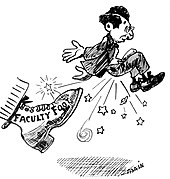
Back إقالة (عمل) Arabic Fyring Danish Abberufung German Despido laboral Spanish Licenciement French פיטורים HE Menesztés Hungarian Pemutusan hubungan kerja ID Licenziamento Italian 解雇 Japanese
This article has multiple issues. Please help improve it or discuss these issues on the talk page. (Learn how and when to remove these template messages)
|

Dismissal (also called firing) is the termination of employment by an employer against the will of the employee. Though such a decision can be made by an employer for a variety of reasons,[1] ranging from an economic downturn to performance-related problems on the part of the employee, being fired has a strong stigma in some cultures.
To be dismissed, as opposed to quitting voluntarily (or being laid off), is often perceived as being the employee's fault. Finding new employment may often be difficult after being fired, particularly if there is a history of being terminated from a previous job, if the reason for firing is for some serious infraction, or the employee did not keep the job very long. Job seekers will often not mention jobs that they were fired from on their resumes; accordingly, unexplained gaps in employment are often regarded as a red flag.
- ^ Congress, Senate., United States, Committee on Foreign Relations (1953). "Mutual Security Act of 1953: Hearings Before the Committee on Foreign Relations, United States Senate, Eighty-third Congress, First Session, on a Bill to Amend the Mutual Security Act of 1951, and for Other Purposes ...". Economic Assistance, American. U.S. Government Printing Office, 1953: 470.
{{cite journal}}: CS1 maint: multiple names: authors list (link)
© MMXXIII Rich X Search. We shall prevail. All rights reserved. Rich X Search